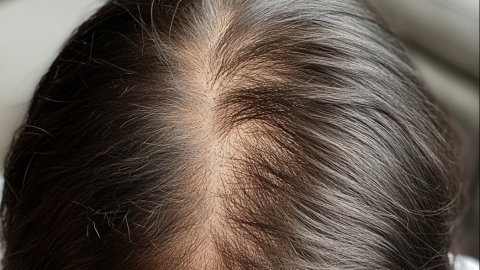Why did my hair start falling out heavily all of a sudden?
Generally speaking, hair loss is referred to as alopecia. Sudden and significant hair loss may be caused by excessive mental stress, unbalanced nutrition intake, seborrheic dermatitis, alopecia areata, systemic lupus erythematosus (SLE), and other factors. It is recommended to seek timely medical consultation and undergo treatment under a physician's guidance. Detailed explanations are as follows:

1. Excessive Mental Stress
When an individual remains in a state of prolonged mental tension, anxiety, or high stress, the body secretes stress hormones such as adrenaline. These hormones can disrupt the normal hair follicle cycle, causing more follicles to prematurely enter the telogen (resting) phase, resulting in significant hair shedding. In daily life, one should learn to regulate emotions, relieve stress through physical activity, meditation, or talking with others, and maintain a positive mindset and emotional stability.
2. Imbalanced Nutrition Intake
When the diet lacks essential nutrients necessary for hair growth—such as protein, B vitamins, iron, and zinc—the hair follicles may not receive sufficient nourishment. This can impair normal hair growth, making hair fragile and prone to breakage, eventually leading to extensive hair loss. It is recommended to maintain a diverse diet, including protein-rich foods such as meat and legumes, as well as fresh fruits, vegetables, and whole grains rich in vitamins and minerals.
3. Seborrheic Dermatitis
Seborrheic dermatitis is often caused by overactive sebaceous glands and excessive proliferation of microorganisms such as Malassezia. The inflammation affects the microenvironment of the hair follicles, impeding normal hair growth and causing hair to loosen and fall out easily. It is commonly accompanied by symptoms such as oily scalp, itching, redness, and flaking. Treatment should follow medical advice and may include medications such as ketoconazole shampoo, selenium sulfide shampoo, and vitamin B6 tablets.
4. Alopecia Areata
Alopecia areata may be associated with autoimmune dysfunction, genetic predisposition, emotional stress, and other factors. The immune system mistakenly attacks the hair follicles, causing damage and disrupting normal hair growth, resulting in round or oval patches of hair loss. In severe cases, it may progress to complete hair loss (alopecia universalis). Typically, there are no significant physical discomforts, although psychological distress may occur. Patients may use medications such as minoxidil solution, halometasone cream, and triamcinolone acetonide injections under a doctor's guidance.
5. Systemic Lupus Erythematosus (SLE)
Systemic lupus erythematosus may be associated with multiple factors including genetic predisposition, environmental triggers, and estrogen levels. Autoantibodies attack multiple body systems, including the skin and hair follicles, damaging follicular structures and interfering with normal hair growth, leading to thinning, breakage, and massive hair loss. Other symptoms may include facial rashes, joint pain, and oral ulcers. Patients should follow medical advice for treatment with medications such as hydroxychloroquine sulfate tablets, methotrexate tablets, and prednisone tablets.
In daily life, it is important to ensure adequate sleep, avoid frequent hair perming or dyeing, and reduce the use of harsh shampoos to help prevent sudden and significant hair loss.






